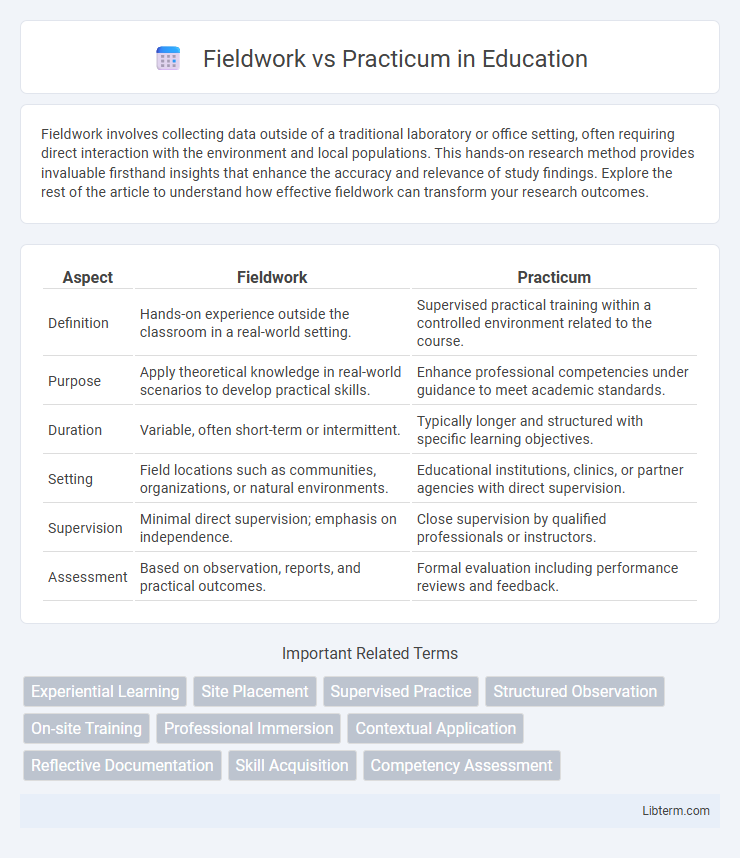Fieldwork involves collecting data outside of a traditional laboratory or office setting, often requiring direct interaction with the environment and local populations. This hands-on research method provides invaluable firsthand insights that enhance the accuracy and relevance of study findings. Explore the rest of the article to understand how effective fieldwork can transform your research outcomes.
Table of Comparison
| Aspect | Fieldwork | Practicum |
|---|---|---|
| Definition | Hands-on experience outside the classroom in a real-world setting. | Supervised practical training within a controlled environment related to the course. |
| Purpose | Apply theoretical knowledge in real-world scenarios to develop practical skills. | Enhance professional competencies under guidance to meet academic standards. |
| Duration | Variable, often short-term or intermittent. | Typically longer and structured with specific learning objectives. |
| Setting | Field locations such as communities, organizations, or natural environments. | Educational institutions, clinics, or partner agencies with direct supervision. |
| Supervision | Minimal direct supervision; emphasis on independence. | Close supervision by qualified professionals or instructors. |
| Assessment | Based on observation, reports, and practical outcomes. | Formal evaluation including performance reviews and feedback. |
Understanding Fieldwork and Practicum: Key Definitions
Fieldwork involves immersive, hands-on experience in a real-world setting, allowing students to apply theoretical knowledge through direct observation and participation. Practicum is a supervised, structured educational experience designed to develop specific professional skills within a controlled environment. Both fieldwork and practicum serve as crucial components in experiential learning, emphasizing practical application and skill development tailored to academic and career objectives.
Core Objectives: What Each Experience Aims to Achieve
Fieldwork centers on applying theoretical knowledge in real-world environments to develop practical skills and professional competence. Practicum emphasizes supervised, hands-on experiences designed to integrate classroom learning with direct client or project interaction. Both aim to enhance critical thinking, ethical decision-making, and professional readiness within their respective disciplines.
Structure and Duration: Fieldwork vs Practicum
Fieldwork typically involves extended, hands-on experience in a real-world setting, often spanning several weeks to months, allowing deep immersion in professional environments. Practicum is usually shorter in duration, ranging from a few days to a few weeks, and follows a more structured curriculum with specific learning objectives and close supervision. The structure of fieldwork is flexible and learner-driven, while practicum emphasizes guided practice within clearly defined tasks and schedules.
Supervision and Mentorship Differences
Fieldwork typically involves structured supervision with direct oversight by experienced professionals who provide real-time feedback on practical skills, ensuring adherence to industry standards. Practicum emphasizes mentorship, fostering a collaborative learning environment where mentors guide students through reflective practice, professional development, and integration of theoretical knowledge. The distinction lies in fieldwork's focus on skill validation through supervision, while practicum prioritizes growth via personalized mentorship.
Skill Development: Hands-On Learning in Practice
Fieldwork offers immersive, real-world experiences that cultivate critical problem-solving and adaptability skills by engaging students directly in community or professional settings. Practicum emphasizes supervised, structured skill acquisition in controlled environments, enabling students to apply theoretical knowledge to practical scenarios with guided feedback. Both methods enhance competency and confidence, fostering essential hands-on learning crucial for career readiness in various disciplines.
Common Settings: Where Fieldwork and Practicum Occur
Fieldwork commonly takes place in community settings such as hospitals, schools, and social service agencies, providing hands-on experience in real-world environments. Practicums often occur within academic or clinical institutions, including university labs and specialized training centers, offering supervised application of theoretical knowledge. Both settings emphasize experiential learning but differ in location and structure based on discipline-specific requirements.
Academic Integration: Coursework and Practical Experience
Fieldwork emphasizes immersive hands-on experience directly related to academic theories, enhancing practical skills through real-world application. Practicum offers structured supervision and reflection aligned with coursework, facilitating a deeper understanding of academic concepts in professional contexts. Both methods integrate theoretical knowledge with practical exposure, crucial for comprehensive academic and professional development.
Assessment and Evaluation Methods
Fieldwork assessment emphasizes direct observation, reflective journals, and competency checklists to evaluate practical skills in real-world settings. Practicum evaluation often incorporates formal grading rubrics, supervisor evaluations, and student self-assessments to measure theoretical knowledge application and professional development. Both methods prioritize feedback loops and performance metrics to ensure skill mastery and learning outcomes alignment.
Career Impact: How Each Prepares You for the Workforce
Fieldwork offers hands-on experience by immersing students directly in real-world environments, enhancing practical skills and workplace adaptability. Practicum combines academic theories with supervised practice, emphasizing reflective learning and professional development essential for career readiness. Both approaches build critical competencies, with fieldwork fostering immediate task proficiency and practicum supporting long-term career growth through guided skill refinement.
Choosing the Right Path: Fieldwork or Practicum?
Choosing between fieldwork and practicum depends on your learning goals and professional requirements. Fieldwork offers hands-on experience in real-world settings, ideal for developing practical skills and networking within your industry. Practicum provides a structured, supervised environment focused on applying theoretical knowledge and gaining specific competencies necessary for certification or licensure.
Fieldwork Infographic

 libterm.com
libterm.com